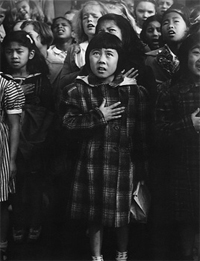
I recently visited the MOMA in New York City, where I had the chance to see a print of Dorthea Lange’s famous image of a Japanese American girl reciting the Pledge of Allegiance hanging in their photography gallery. Lange’s photo, taken during the Internment era, when Japanese Americans’ loyalty, Constitutional freedoms—and indeed, their human dignity—were under extreme duress, serves as a witness to the injustices of the past, but also reminds us of the fact that we, despite our often-difficult political relationship to this nation that we claim as our home, are a part of it. That we participate in the making of the messy narrative that is American history, and that the narratives that make up the history of this nation are necessarily entangled with our own. In short, this is our America, too.
Independence Day is coming up, and in thinking about our history as Americans of color, I’m inspired by the fraught complexity of the relationship between nation and speaker that exists this poem by Claude McKay [text via the Poetry Foundation]:
America
by Claude McKay
Although she feeds me bread of bitterness,And sinks into my throat her tiger’s tooth,Stealing my breath of life, I will confessI love this cultured hell that tests my youth.Her vigor flows like tides into my blood,Giving me strength erect against her hate,Her bigness sweeps my being like a flood.Yet, as a rebel fronts a king in state,I stand within her walls with not a shredOf terror, malice, not a word of jeer.Darkly I gaze into the days ahead,And see her might and granite wonders there,Beneath the touch of Time’s unerring hand,Like priceless treasures sinking in the sand.
Prompt: Write a poem in the form of a letter to your country.